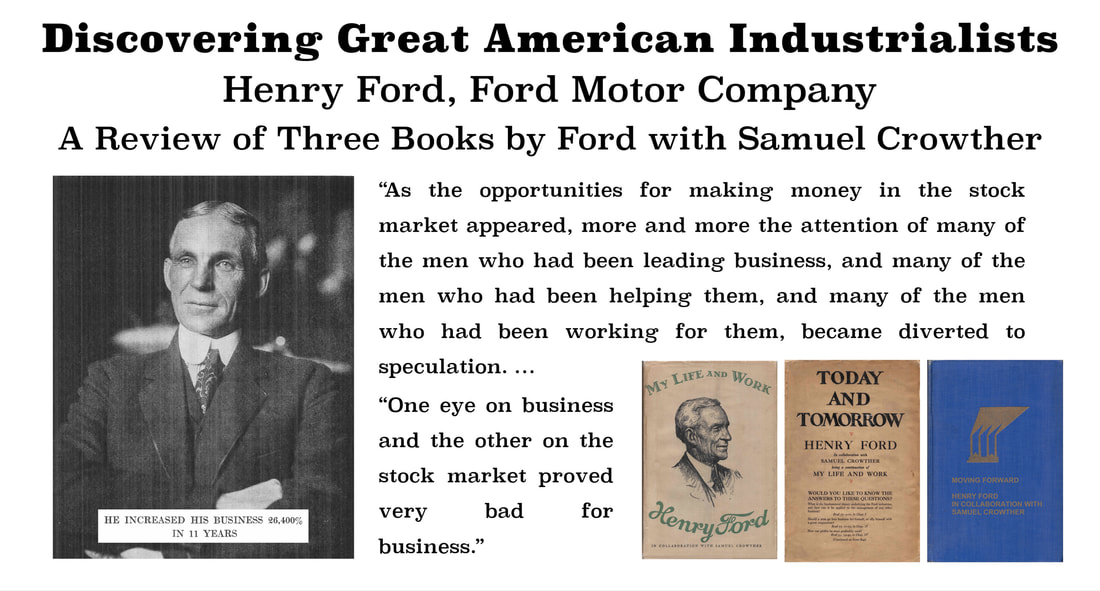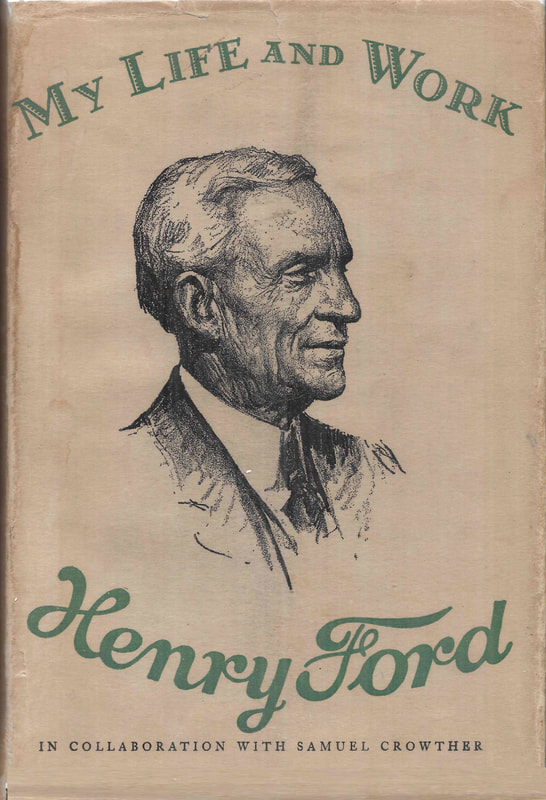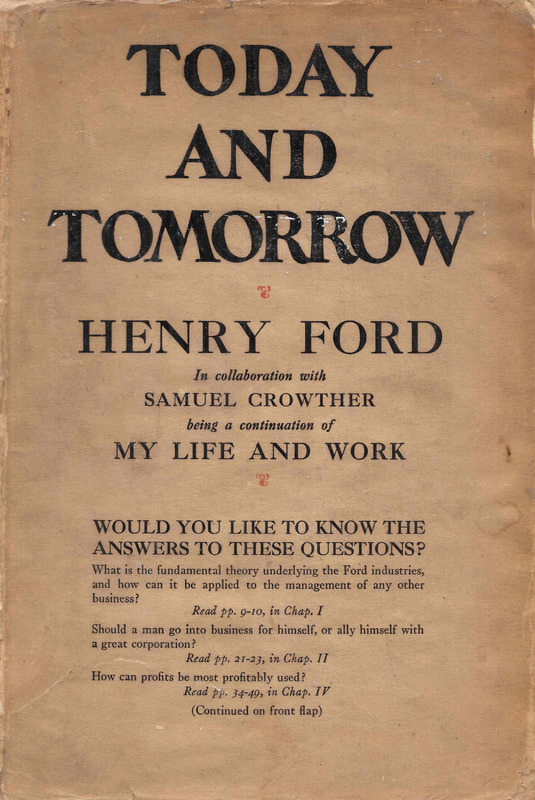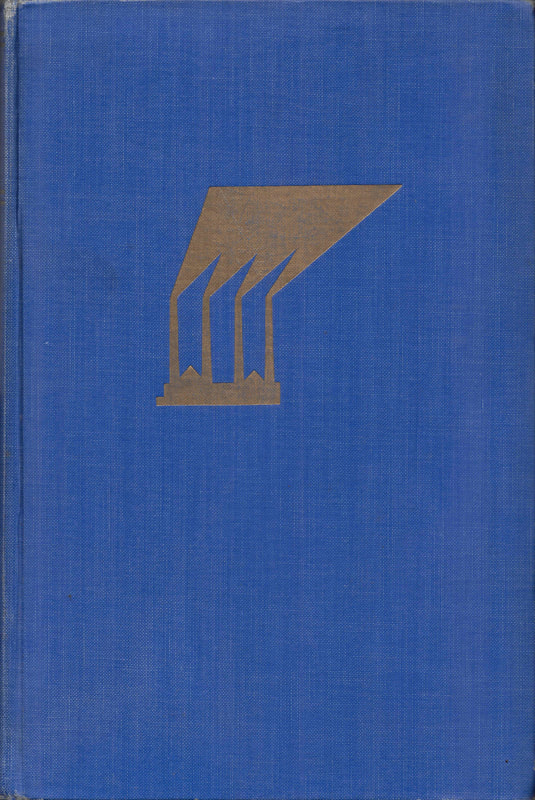Reviews of Henry Ford's Three Books
|
|
Date Published: June 29, 2021
Date Modified: June 30, 2024 |
"The natural thing to do is to work—to recognize that prosperity and happiness can be obtained only through honest effort. Human ills flow largely from attempting to escape from this natural course. I have no suggestion which goes beyond accepting in its fullest this principle of nature. I take it for granted that we must work. All that we have done comes as the result of a certain insistence that since we must work it is better to work intelligently and forehandedly; that the better we do our work the better off we shall be.
"All of which I conceive to be merely elemental common sense.
"I am not a reformer."
"All of which I conceive to be merely elemental common sense.
"I am not a reformer."
Henry Ford, My Life and Work
A Review of Three Books by Henry Ford in Collaboration with Samuel Crowther
- Henry Ford: "My Life and Work"
- Henry Ford: "Today and Tomorrow"
- Henry Ford: "Moving Forward"
Henry Ford: "My Life and Work"
|
For those that think that Henry Ford was just the "creator of the assembly line" like I was taught in school in the '70s, I think the best way to get across the complexity of the man is to just post up some of my favorite quotes from this book--the initial book in this trilogy-- published in 1922.
|
- "A low wage business is always insecure."
- "If you expect a man to give his time and energy, fix his wages so that he will have no financial worries. It pays."
Unfortunately, three pages of this 298 page book seem so out of place it would cause any reader to pause - in shock. Ford writes of his thought that so many "negative influences" are traceable to "one racial source."
Reading the whole book up until this point, I wondered where the view that Ford was anti-Semitic came from. To this day, these three pages still bother me, and he always comes to mind when I read any "generalization" or "stereotype" written by any individual about some group.
Don't we see such generalizations everyday with the usages of the words "all" and "every?" We have to struggle with our prejudices, but here was a person who believed in treating all his workers from around the world fairly, took the initiative to seek out and hire individuals from prisons, fought to use machinery to reduce the back-breaking manual burdens on men, and, yet, he carried a blind spot in his psyche toward one group of men, women and children.
I am glad I read this whole book, especially within the context of these three pages. For the rest of my life I will be watching for any such "blind spots" in my psyche and those of others. It would be a better world if we all thought of the Golden Rule as applied to all of mankind.
I thought I was going to read a book on automation, but I found a three-page life lesson that has caused me to be introspective--and much more observant of others.
Don't we see such generalizations everyday with the usages of the words "all" and "every?" We have to struggle with our prejudices, but here was a person who believed in treating all his workers from around the world fairly, took the initiative to seek out and hire individuals from prisons, fought to use machinery to reduce the back-breaking manual burdens on men, and, yet, he carried a blind spot in his psyche toward one group of men, women and children.
I am glad I read this whole book, especially within the context of these three pages. For the rest of my life I will be watching for any such "blind spots" in my psyche and those of others. It would be a better world if we all thought of the Golden Rule as applied to all of mankind.
I thought I was going to read a book on automation, but I found a three-page life lesson that has caused me to be introspective--and much more observant of others.
Henry Ford: "Today and Tomorrow"
|
Probably the best way to review Henry Ford books is with quotes:
|
- "If man is not better off for buying than he would be if he had kept his money in his pocket, there is something wrong."
- "A man who must be told his own business by someone outside of it will render his best service by quickly getting out of business."
As you can tell, Henry Ford did not mince words.
Henry Ford: "Moving Forward"
|
This is the last in the Ford-Crowther trilogy.
This is two years into the Great Depression and the book opens with a question most sane people of the day were asking, "Is it possible that this country is losing its business bearings?" But Henry Ford continues, "There is talk of high wages being a burden." He never saw wages as a burden. This book takes aim at those who would say the way back to prosperity was to cut production and wages. Henry Ford who shocked the world with a $5.00 eight-hour day in 1914, went to a $6.00 eight-hour day in 1919, and announced--into the teeth of the Great Depression--on December 1, 1929 a $7.00 eight-hour day. |
Henry Ford was maniacal about his beliefs and stood by them. Moving Forward continues the journey of the two books. The philosophy of this book is presented early:
"Only disaster can result when the fundamental principles of business are disregarded and what looks like the easiest way is taken.
"These fundamentals, as I [Henry Ford] see them, are:
"Only disaster can result when the fundamental principles of business are disregarded and what looks like the easiest way is taken.
"These fundamentals, as I [Henry Ford] see them, are:
- To make an ever-increasingly large quantity of goods of the best possible quality, to make them in the best and most economical fashion, and to force them out on the market.
- To strive always for higher quality and lower prices as well as lower costs.
- To raise wages gradually but continuously-and never to cut them.
- To get the goods to the consumer in the most economical manner so that the benefits of low-cost production may reach him.



